
“They Kept Spamming My Email… So I Joined Their Chat”
Interview With ExpertSpam is, unfortunately, an unavoidable side effect of having an email address. At this point, most of us have probably already given up on trying to keep up with our inboxes overflowing with various promotions, newsletters, and money offerings from African princes and just ignore them. However, some persist and refuse to succumb to this modern issue, finding ingenious ways to put an end to it.
Just like this person, who, after being spammed with random company emails, tried messing with them in return. Their actions definitely worked, as the emails stopped, and as a bonus, they got some giggles out of it too.
Scroll down to find the full story and conversation with Rajvardhan Oak, cyber security author and online fraud and scam researcher, and regional chief security officer Winifred Ndukwe, who kindly agreed to tell us more about spam emails and how to avoid them.
Many people have already given up fighting with spam and choose just to ignore it
Image credits: Wavebreak Media / freepik (not the actual photo)
But not this person, who pettily got back at the company that randomly started spamming him with emails
Image credits: freepik
Image credits: BiackPanda
160 billion spam emails are sent every day
Image credits: Racool_studio / freepik (not the actual photo)
Out of 347 billion daily emails sent, 160 billion are spam emails. This means that almost half of the letters that end up in our digital inboxes are unnecessary junk.
But how do spammers know where to send these unsolicited messages? “A person’s email can become susceptible to spam through various means, such as public exposure (e.g., sharing it in online forums or on social media), or data breaches at websites or services they use (breached data is often sold on the dark web),” explains Rajvardhan Oak, cyber security author and online fraud and scam researcher.
“Sometimes spammers will scrape public registries (such as those of public universities) to obtain addresses to spam,” he adds.
The content of spam emails can range from advertisements and subscriptions to fake giveaways and job offers, which can pose a real threat. “Beyond being a nuisance that clutters inboxes, spam emails are often used as vehicles for phishing attacks, where malicious actors impersonate legitimate entities to steal sensitive information such as login credentials, banking details, or personal data,” says Oak.
“For individuals, this can lead to identity theft, and for organizations, it can mean financial loss, data breaches, or even reputational damage,” warns regional chief security officer Winifred Ndukwe.
To avoid spam emails, it’s recommended to use a reliable email provider, like Gmail or Outlook
Image credits: freepik (not the actual photo)
To avoid spam emails and protect ourselves from potential scam attacks, Oak recommends using a reliable email provider with robust spam filters, like Gmail or Outlook. “Ensure these filters are configured to automatically detect and segregate spam emails into a separate folder,” he notes.
He also advises refraining from sharing email addresses publicly on forums, websites, or social media. This helps to reduce your visibility to spammers and bots.
“Use a secondary email address for sign-ups, newsletters, or online purchases to protect your primary inbox. Unsubscribe from unwanted newsletters or marketing emails through legitimate links provided, but never interact with unknown or suspicious emails, as this confirms your address is active,” he adds.
Oak additionally suggests periodically reviewing spam sources, blocking them, and reporting them to the email provider. “This provides ground truth labels and helps them improve the machine learning models that are detecting spam.”
For extra protection, Ndukwe recommends enabling multi-factor authentication (MFA) and using strong, unique passwords to secure your accounts. She also warns to not engage with any links in spam emails, as it can make us bigger threats to spam and phishing attacks.
“What might look like a harmless email could be the first step in a sophisticated attack. What worked to protect you last year might need tweaking now, so it’s important to stay informed and cautious,” says Ndukwe.
The author provided more details about the situation in the comments
Commenters applauded author for coming up with an ingenious way to end the spam
Others also chimed in, sharing similar stories
Poll Question
Thanks! Check out the results:
GMail does not recognise dots in a name. So johnsmith@gmail.com will often get mail for john.smith@gmail.com - annoying, but that's Google!
I don't think they recognize any punctuation marks. This can be useful for setting up filters to process/redirect incoming email. In my case, firstlast goes to a work folder, first.last goes to a personal folder, and first_last goes to an ecomm folder. It's like three separate email accounts in one.
Load More Replies...Some 25 years ago, we started receiving group mail from à white-water kayaking group. I contacted our provider, who answered that it was absolutely impossible for two people to have the same address, but obviously one of the group had the same adress as my husband. Then some friends of theirs had a fatal kayaking accident, which was described in great détail on the group mail ( think the movie "Deliverance") and I wrote to all of them saying we were sorry for their friends, but we'd like to be left out of it. Guess the one who had the same address as my husband changed his email, and we never heard from them again.
This is why my gmail address isn't just my name. It's really dumb, but my mom made it when I was little, so it's not a problem. Of course, it's hard for people to spell properly, which can be annoying.
Something similar happened to me. There is a book shop that has the same domain that I own, but theirs is the .co.uk version and mine is .com. I bought mine a long time before they did. People they deal with, even their bank, automatically assume that theirs is the .com. I have had so many personal emails that were meant for this shop. I offered to sell them my domain for no more than the going rate at Namecheap. They refused. I've put as many of their emails as I can work out in a spam folder, but one always slips by. They got very defensive and rude when I politely asked them to make sure the people they deal with use the right domain. So sucks to be them. I will no longer be nice and forward the emails, or tell the people that they have the wrong address.
I get texts asking for money or votes every time there's a congressional election in Wisconsin. I'm in the UK. Also, I used to work at a company in the early nineties that just used first names for email (this was on Unix, before WWW). The American VP was "joe", the UK PA was "joseph", but he was called Joe, so the VP kept getting requests to move boxes between offices in the UK, or inviting him for drinks or lunch.
As far as I remember, Gmail is stupid with dots. From their help: "If someone accidentally adds dots to your address when emailing you, you'll still get that email. For example, if your email is johnsmith@gmail.com, you own all dotted versions of your address: john.smith@gmail.com jo.hn.sm.ith@gmail.com j.o.h.n.s.m.i.t.h@gmail.com" But I think they used to allow creation of a new address with let say an extra dot (maybe some glitch), if it was different from yours and it caused a lot of problems for a lot of people.
I helped set up the first campus email server at a major university and had my choice of addresses. I chose firstname@blah.edu. Really bad choice as I got many emails from students who knew someone with that name. A significant number were quite risqué .
I sure wish there was a button on BP where I could get to the top of the screen with one click.
A woman in the UK apparently uses my email for her eBay purchases. There’s no way to contact eBay. I have her address so I’ve thought about writing her a very nice, “Not sure if you’ve realized it…” letter.
GMail does not recognise dots in a name. So johnsmith@gmail.com will often get mail for john.smith@gmail.com - annoying, but that's Google!
I don't think they recognize any punctuation marks. This can be useful for setting up filters to process/redirect incoming email. In my case, firstlast goes to a work folder, first.last goes to a personal folder, and first_last goes to an ecomm folder. It's like three separate email accounts in one.
Load More Replies...Some 25 years ago, we started receiving group mail from à white-water kayaking group. I contacted our provider, who answered that it was absolutely impossible for two people to have the same address, but obviously one of the group had the same adress as my husband. Then some friends of theirs had a fatal kayaking accident, which was described in great détail on the group mail ( think the movie "Deliverance") and I wrote to all of them saying we were sorry for their friends, but we'd like to be left out of it. Guess the one who had the same address as my husband changed his email, and we never heard from them again.
This is why my gmail address isn't just my name. It's really dumb, but my mom made it when I was little, so it's not a problem. Of course, it's hard for people to spell properly, which can be annoying.
Something similar happened to me. There is a book shop that has the same domain that I own, but theirs is the .co.uk version and mine is .com. I bought mine a long time before they did. People they deal with, even their bank, automatically assume that theirs is the .com. I have had so many personal emails that were meant for this shop. I offered to sell them my domain for no more than the going rate at Namecheap. They refused. I've put as many of their emails as I can work out in a spam folder, but one always slips by. They got very defensive and rude when I politely asked them to make sure the people they deal with use the right domain. So sucks to be them. I will no longer be nice and forward the emails, or tell the people that they have the wrong address.
I get texts asking for money or votes every time there's a congressional election in Wisconsin. I'm in the UK. Also, I used to work at a company in the early nineties that just used first names for email (this was on Unix, before WWW). The American VP was "joe", the UK PA was "joseph", but he was called Joe, so the VP kept getting requests to move boxes between offices in the UK, or inviting him for drinks or lunch.
As far as I remember, Gmail is stupid with dots. From their help: "If someone accidentally adds dots to your address when emailing you, you'll still get that email. For example, if your email is johnsmith@gmail.com, you own all dotted versions of your address: john.smith@gmail.com jo.hn.sm.ith@gmail.com j.o.h.n.s.m.i.t.h@gmail.com" But I think they used to allow creation of a new address with let say an extra dot (maybe some glitch), if it was different from yours and it caused a lot of problems for a lot of people.
I helped set up the first campus email server at a major university and had my choice of addresses. I chose firstname@blah.edu. Really bad choice as I got many emails from students who knew someone with that name. A significant number were quite risqué .
I sure wish there was a button on BP where I could get to the top of the screen with one click.
A woman in the UK apparently uses my email for her eBay purchases. There’s no way to contact eBay. I have her address so I’ve thought about writing her a very nice, “Not sure if you’ve realized it…” letter.

 Dark Mode
Dark Mode 

 No fees, cancel anytime
No fees, cancel anytime 



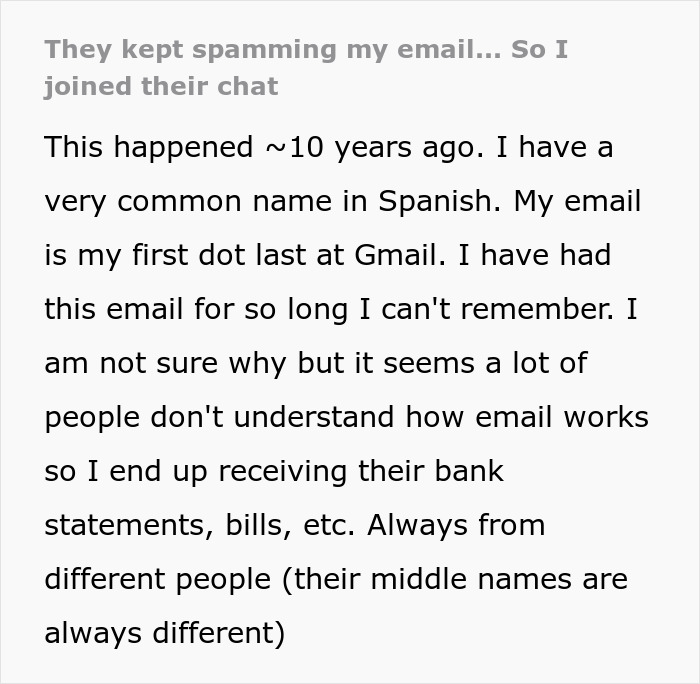
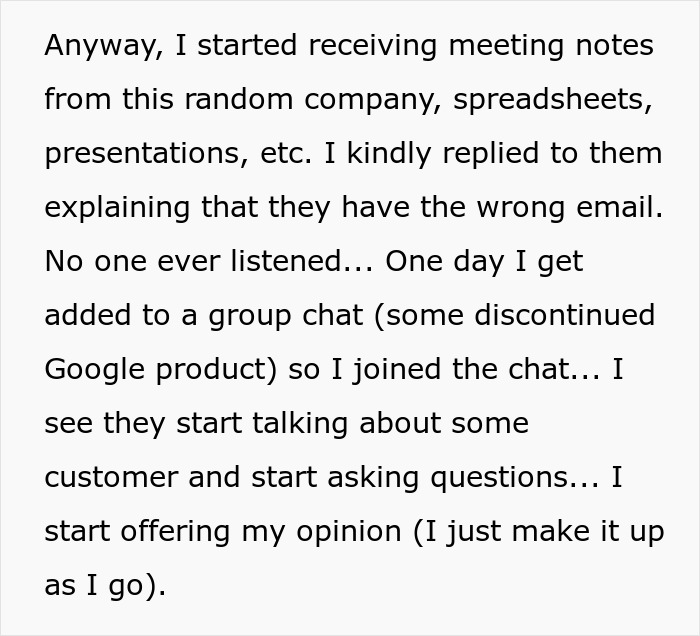
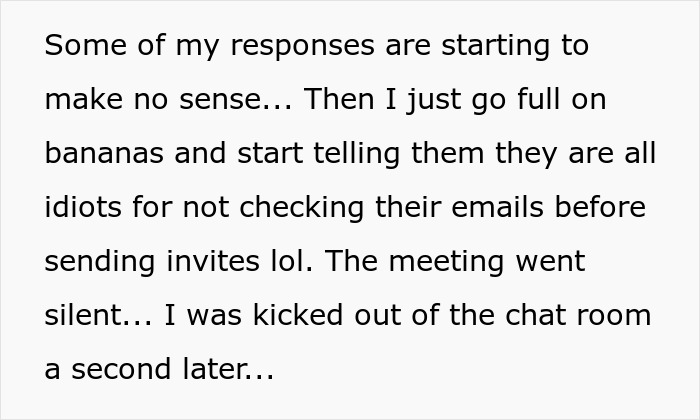
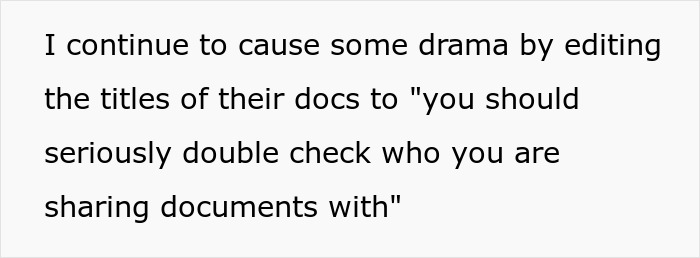
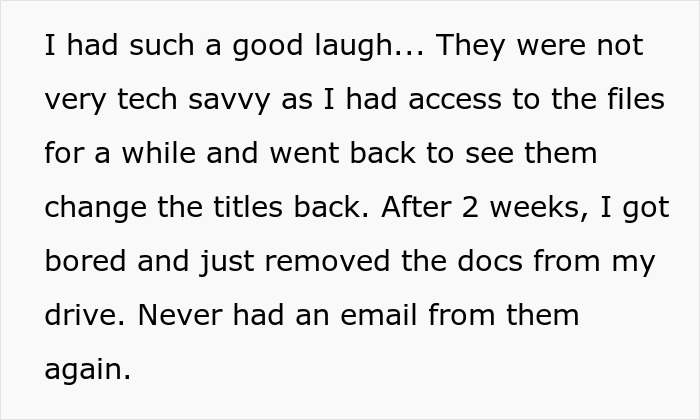
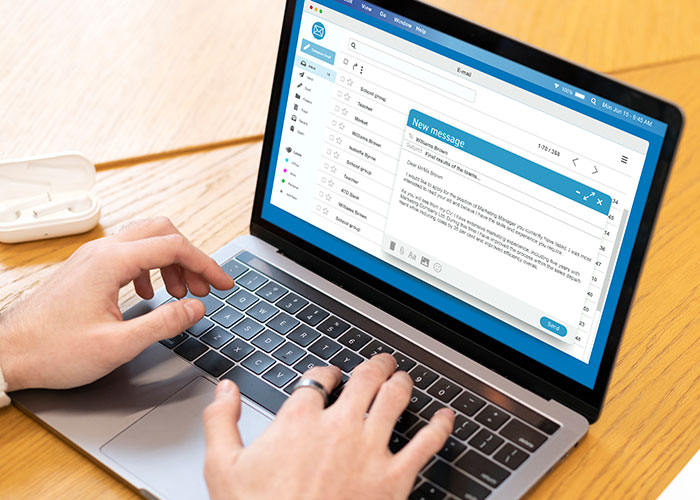

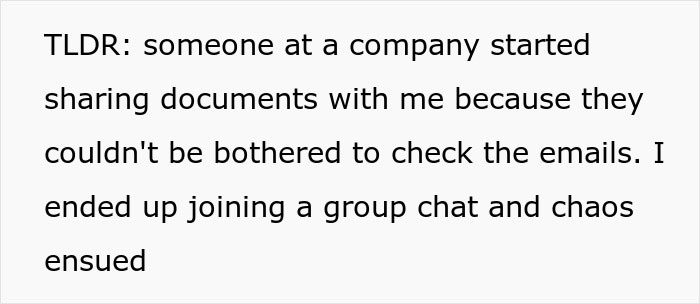


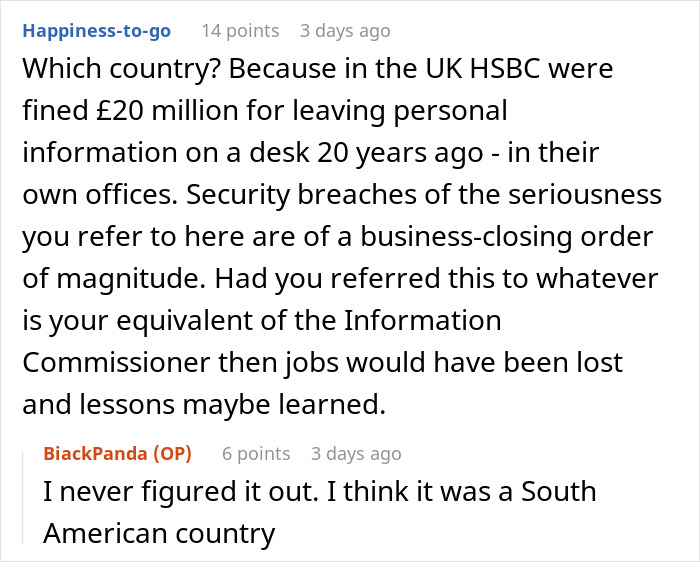
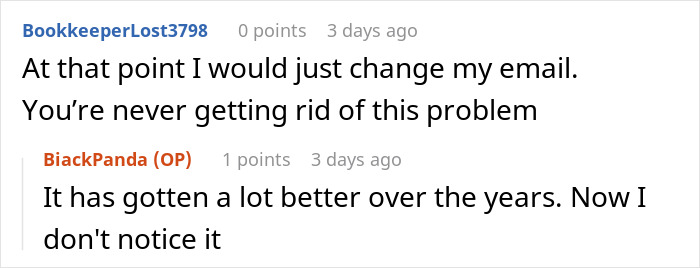
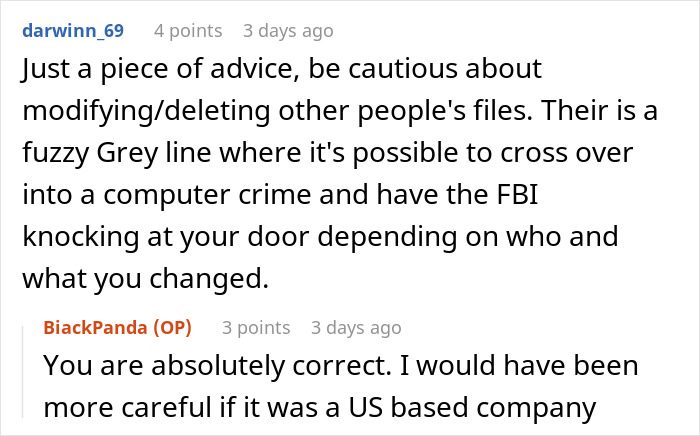

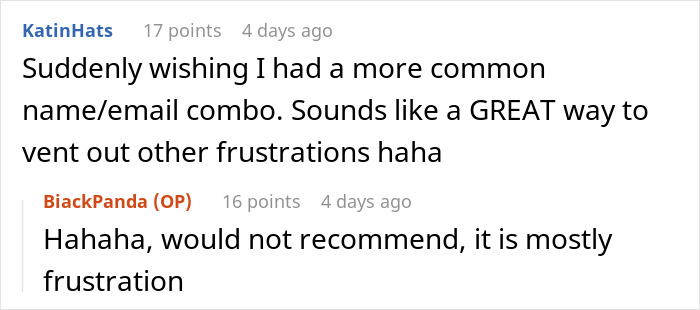
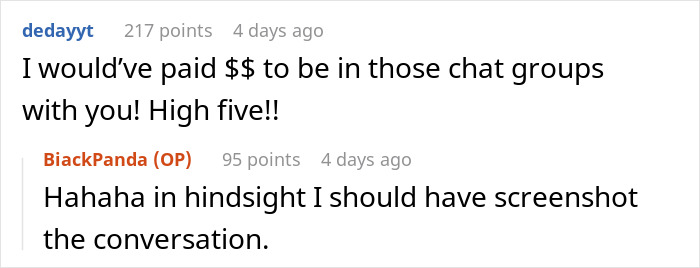
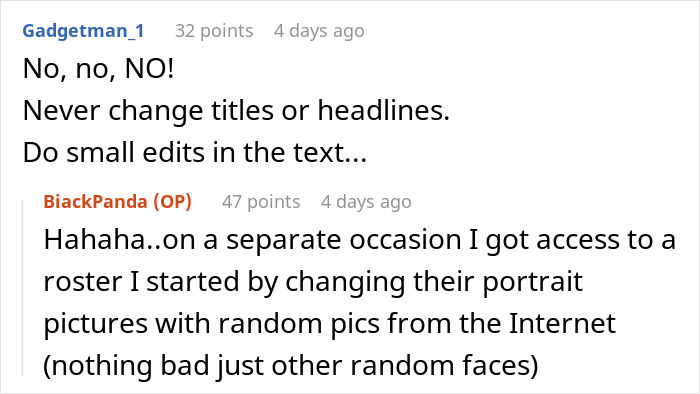
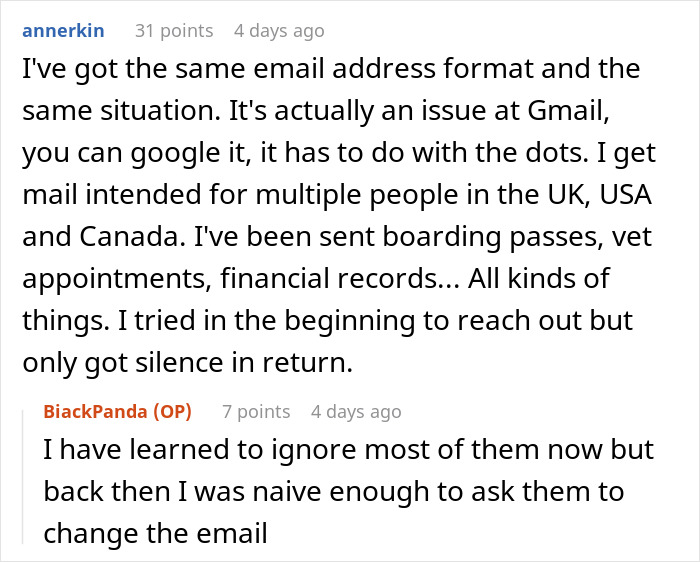
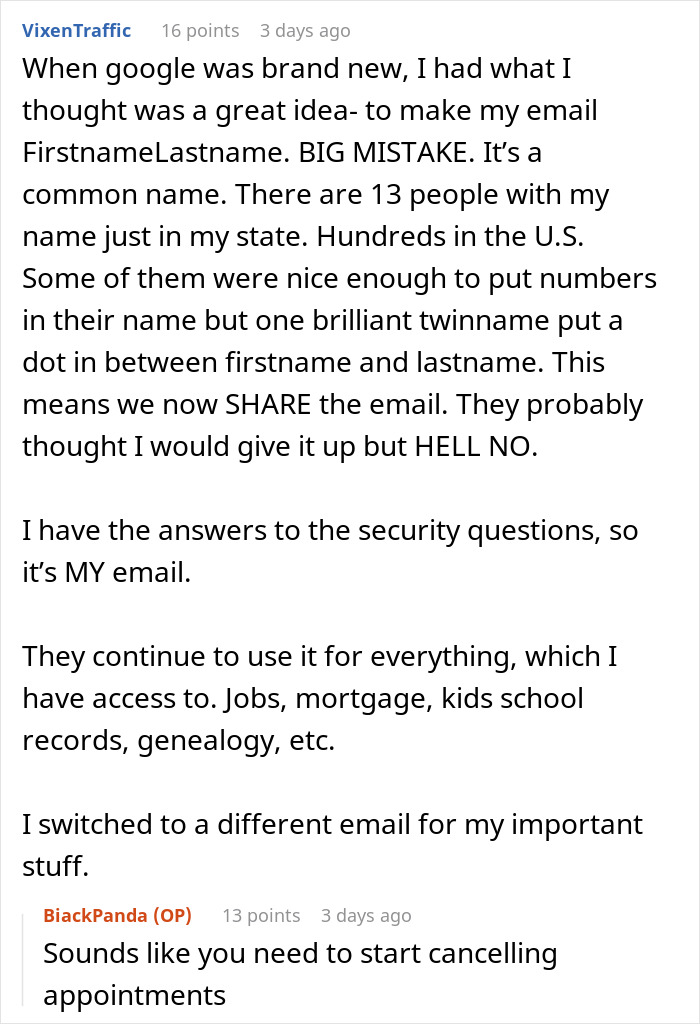

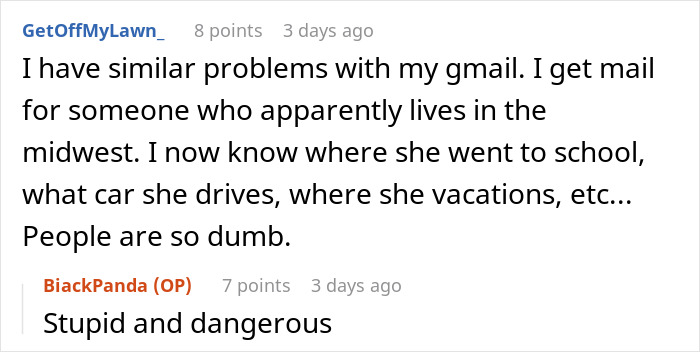
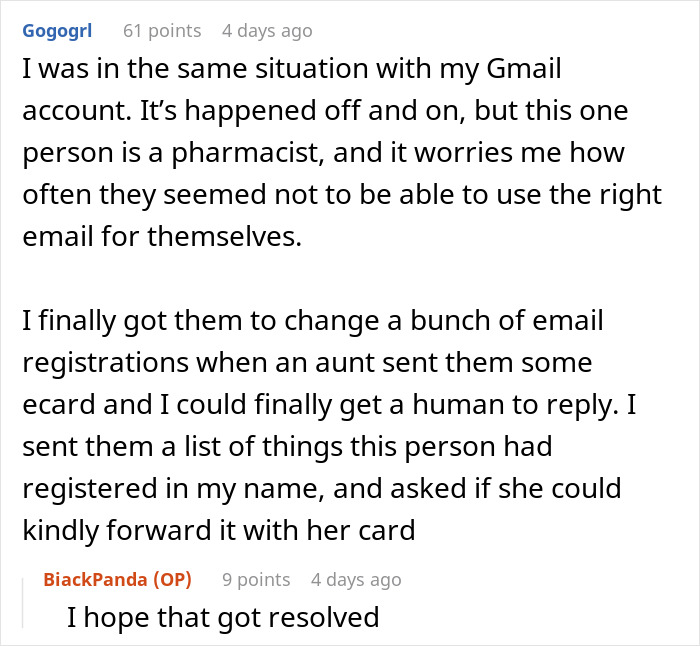
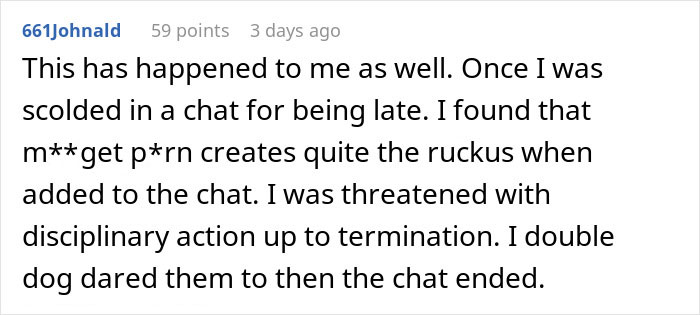
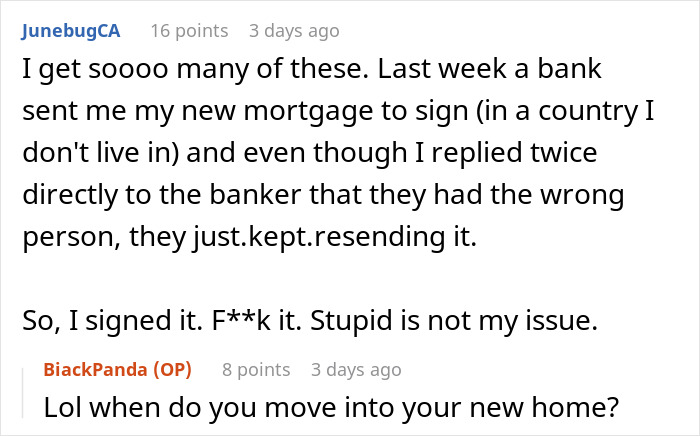
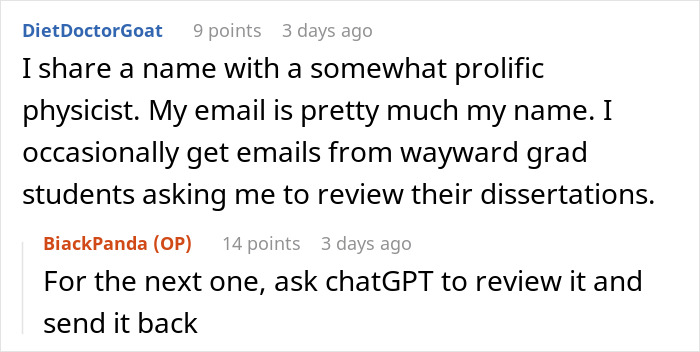
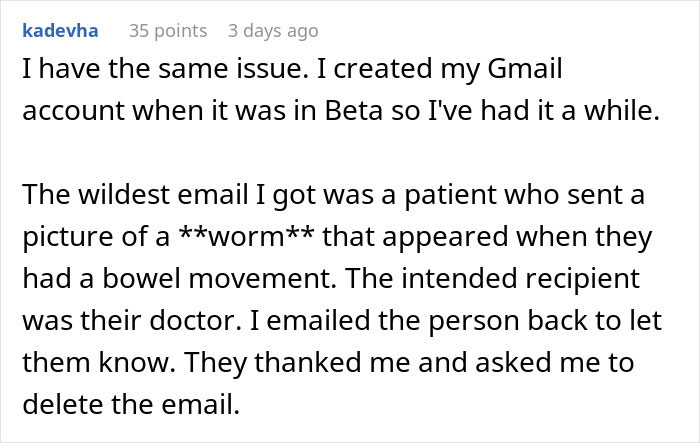
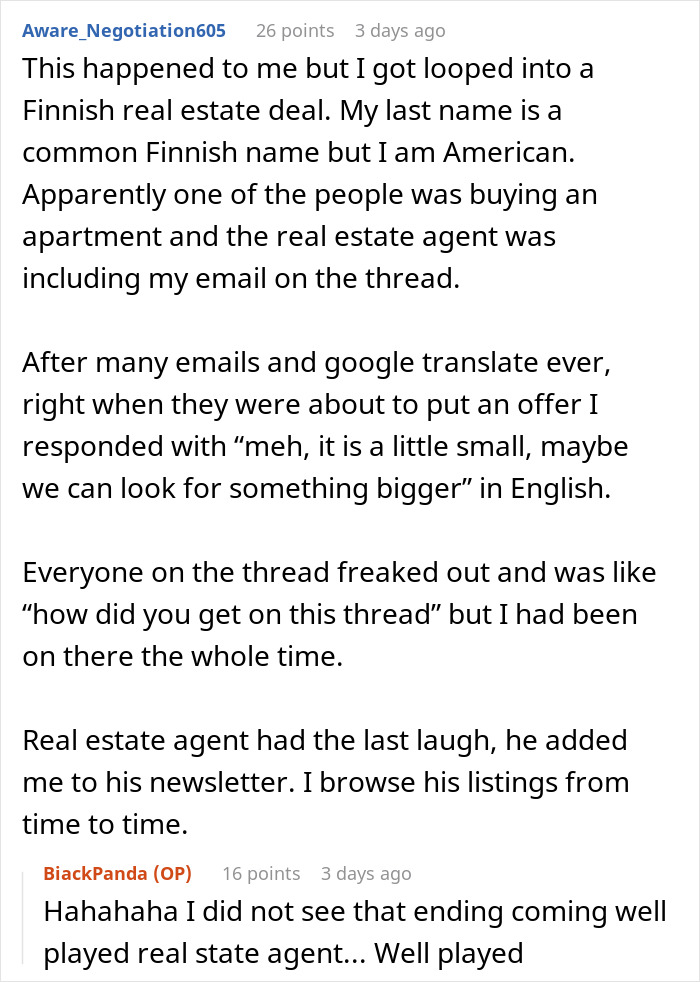
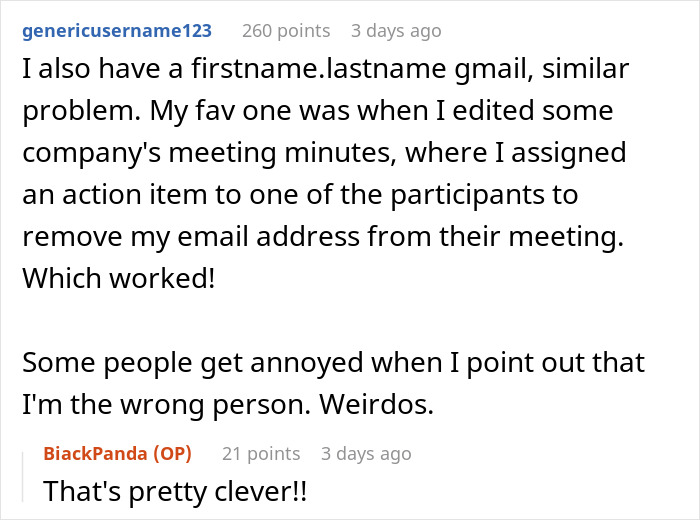
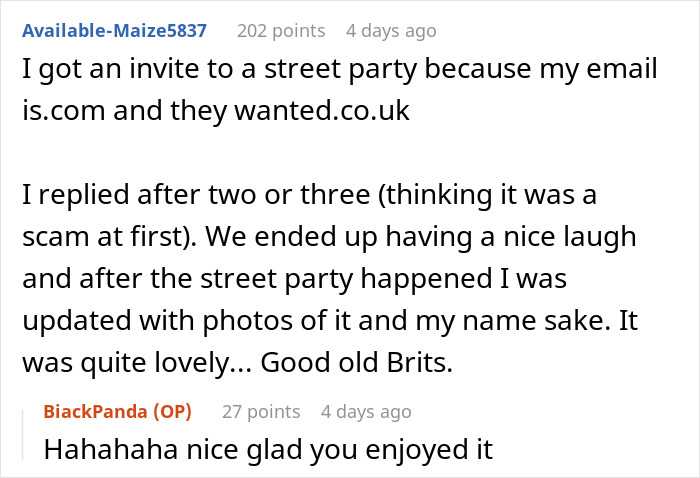
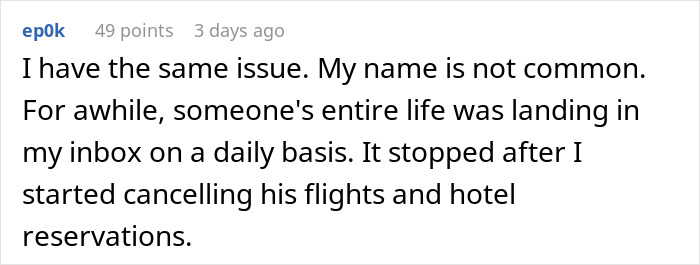

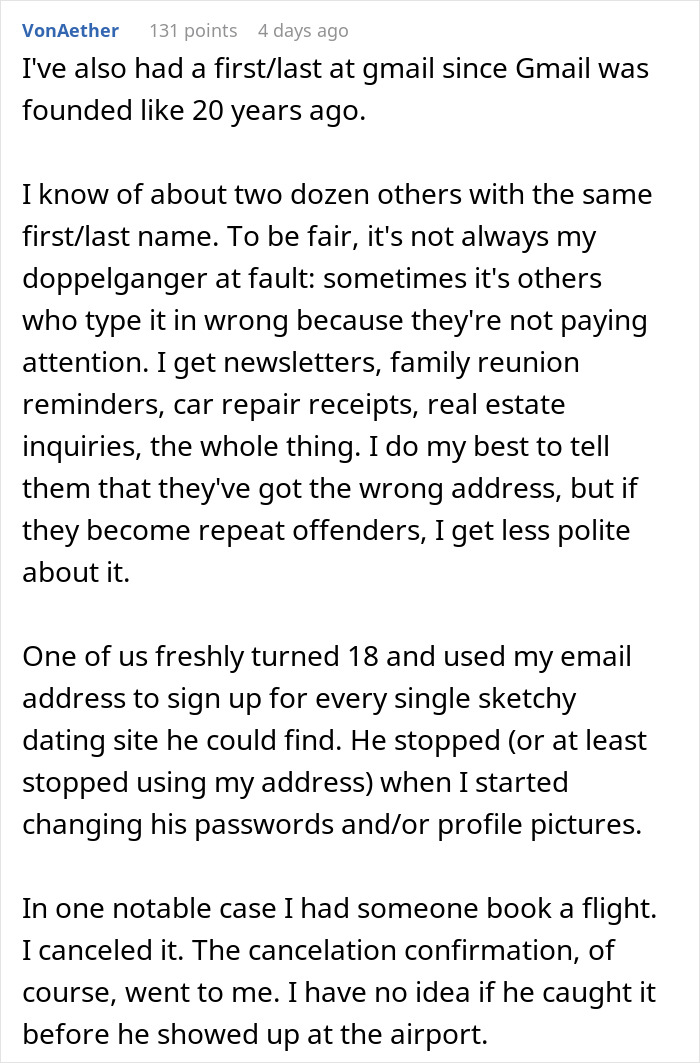
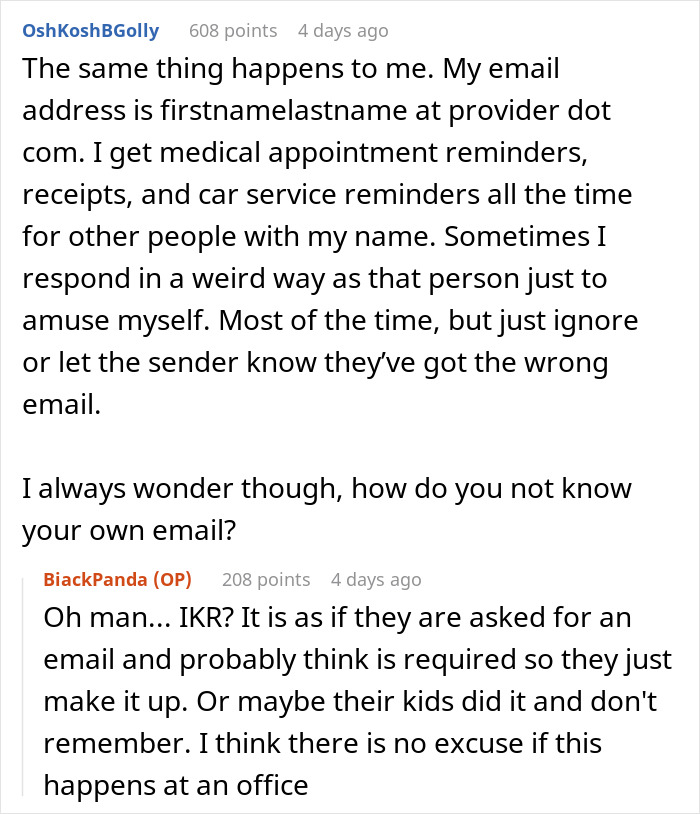
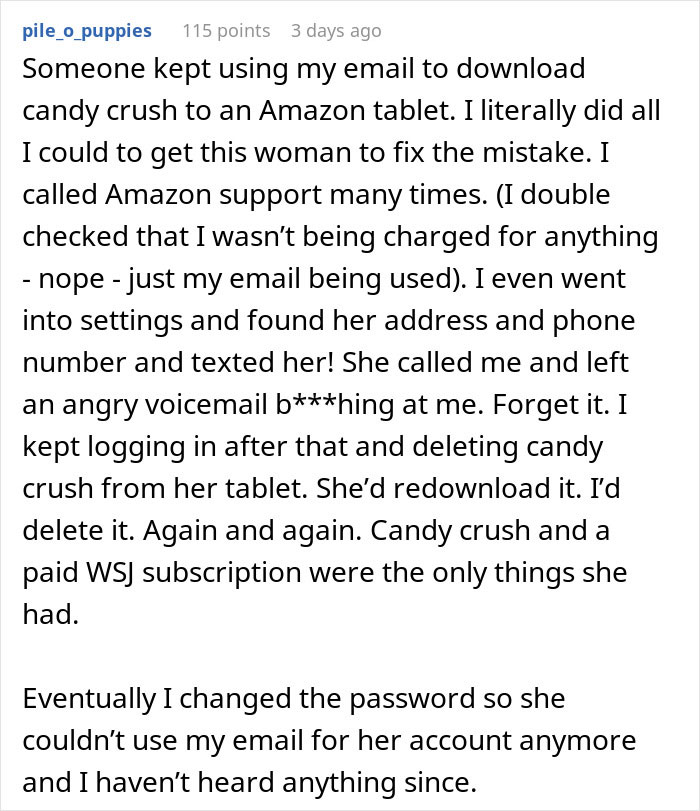
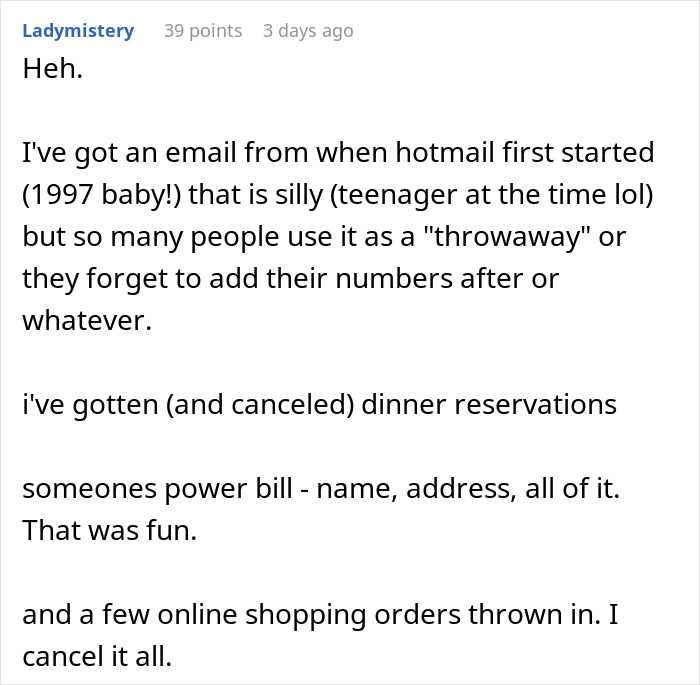
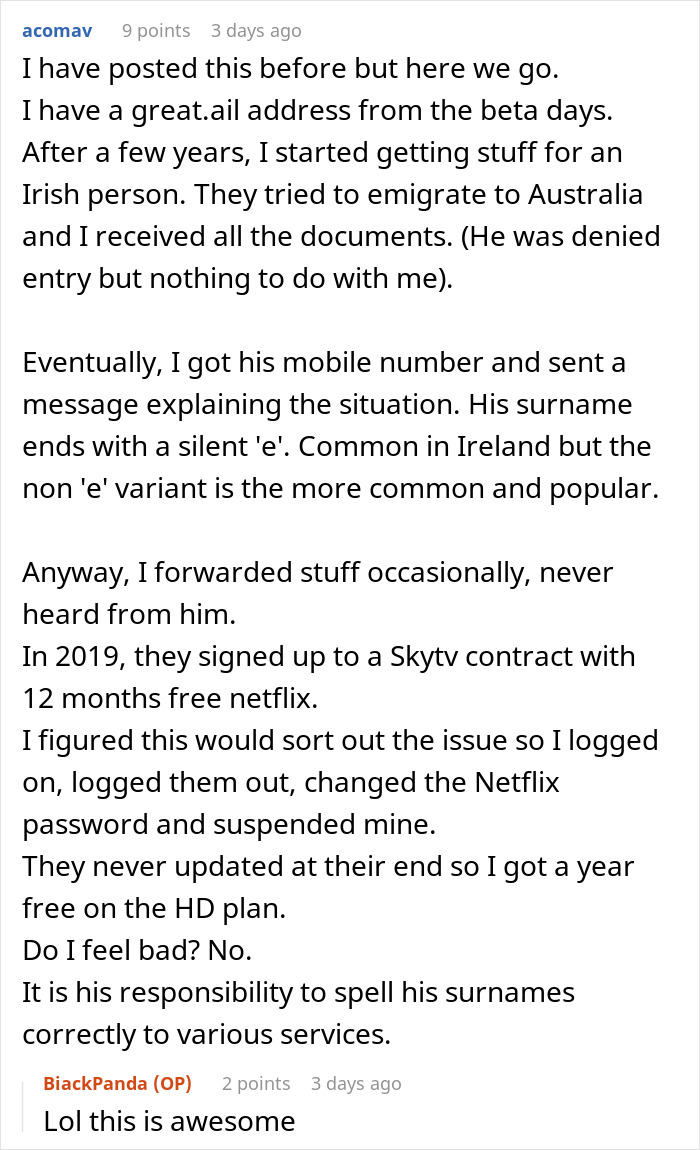






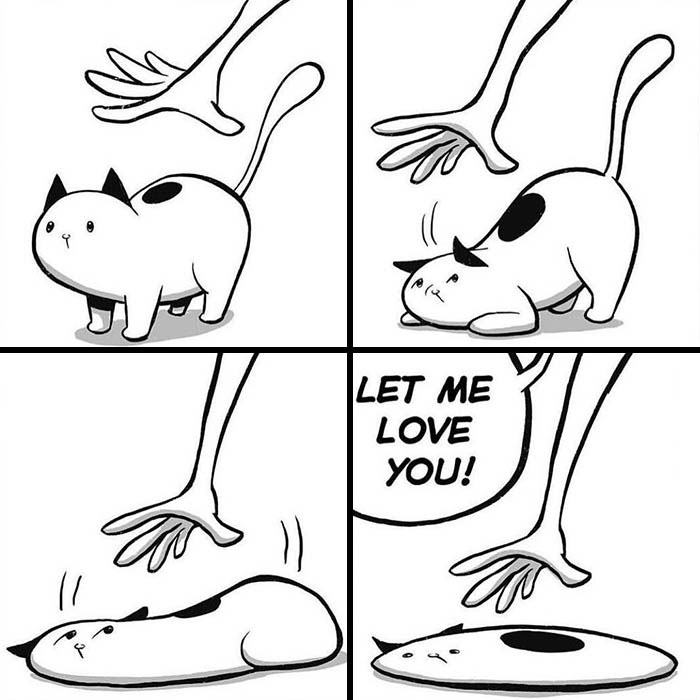

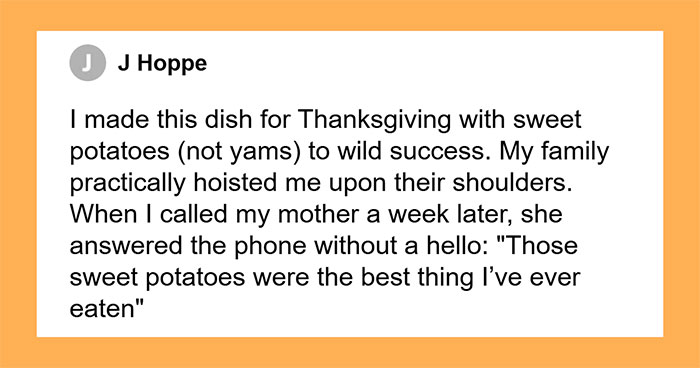


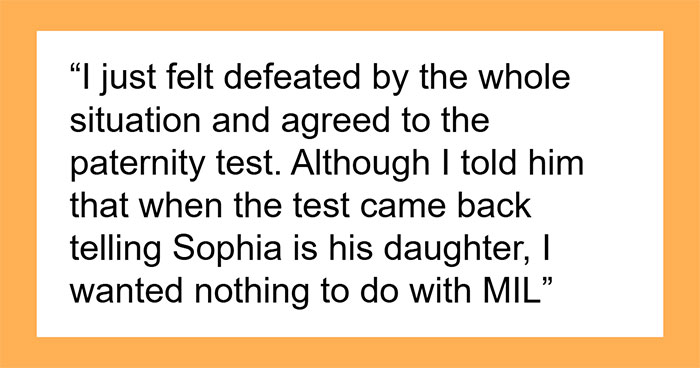









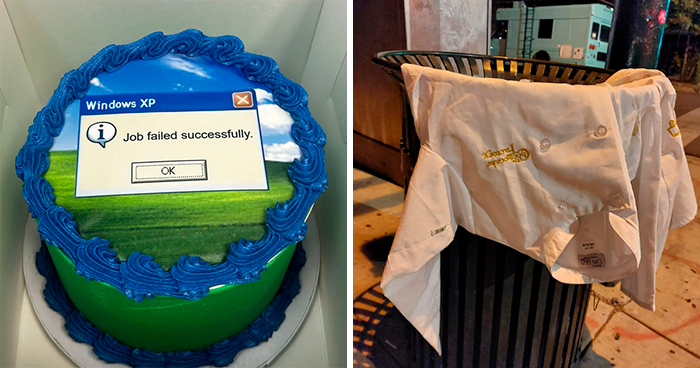

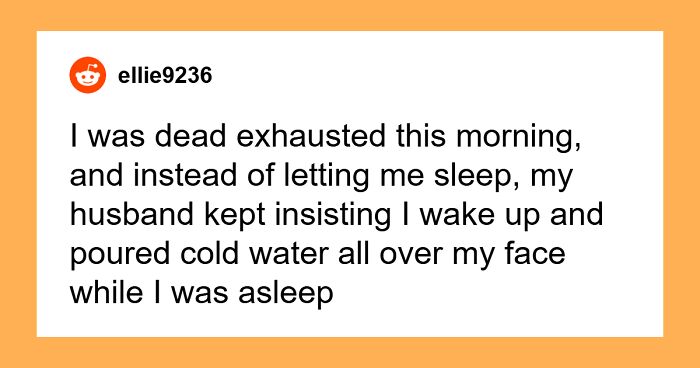
22
23